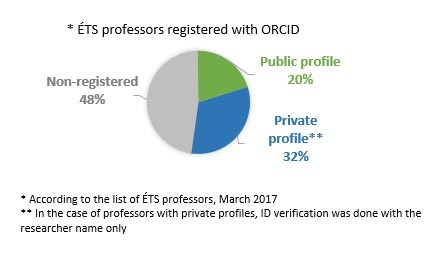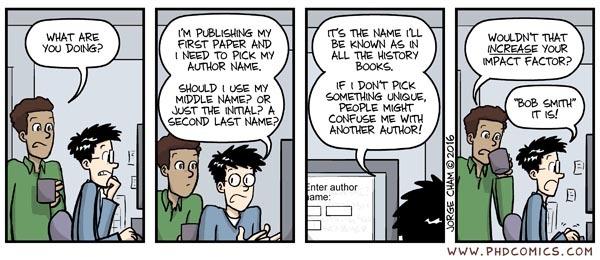ORCID: Managing Researchers' Digital Identity

Do you get unconvincing results when conducting a web search using your researcher name? In Scopus or Web of Science, can all indexed publications that should be assigned to you be retrieved within a single researcher profile? Do you find, when performing an author search with your name, articles that you have not authored ? Are you missing some that should be listed? Whether you are in the process of establishing your reputation as a researcher or your expert status is already acknowledged, the ability to spot your research contributions quickly and effectively can make all the difference. On the one hand, you project the image of a well organized researcher and, on the other, you make things easier for those who are interested in your scientific output.
There are several scientific and social media platforms that offer researchers the opportunity to create their personalized profile. A profile of this type, when managed adequately, helps increase the visibility of your research and, in doing so, contribute to increase your citation rate. If you are busy with research activities and teaching tasks, and wish to limit the time invested in creating and managing an online researcher profile, then registering with ORCID may be a good option for you.
ORCID
Open Researcher and Contributor ID (ORCID) is a unique identifier linked to a researcher to help ensure that his or her publications are rightfully assigned. ORCID was launched in 2012 and now has over 3,500,000 active identifiers. This breakthrough is partly due to the fact that more and more institutions, granting authorities and publishers require it. This is the case with the Institute of Electrical & Electronics Engineers (IEEE), the professional association publishingabout a quarter of the journals in which ÉTS researchers have already published paper:

The Benefits of Having an ORCID Identifier
Using a constant name syntax for a researcher’s publications makes it easier to find all the documents he published during his career, but an author does not fully control how his name will appear in journals or in databases, not to mention that the events of life can also cause name changes. Researchers who have a hyphenated name, a middle name, a hyphenated surname or a name modified by marriage or divorce are at risk to have their name indexed in many different ways. Articles written by researchers sharing similar or identical names are often mixed up and classified in the wrong author profile.

But seriously, it is in the researcher’s best interest to be easily distinguished from other authors. Using a unique ID code reduces the risk of your publications being mixed up with those of another researcher and makes it easier to locate your research contributions. You can get your ORCID identifier free of charge by registering on their Website.
The ORCID Profile
Your ORCID identifier is associated with your ORCID profile, where you can enter information about yourself and your list of publications. The Scopus and Web of Science journal directories propose their own identifiers and it is possible to group documents published in indexed journals by author. These consist mainly of articles or conference proceedings. Your ORCID profile is more inclusive: you can add all your published documents, regardless of journal, as well as your unpublished research contributions (presentations, research data, graphics, etc.). This allows you to provide a more accurate picture of your research activities, especially if you are publishing mostly in journals not indexed in major journal directories, or if your contribution to the advancement of research is communicated in other forms than the scientific article. You can also link your ORCID identifier to your ResearcherID and your Scopus Author ID. This helps ensure that the information available in your different profiles is more reliable.
You can use your ORCID profile to show your achievements to all users, or grant access rights to a restricted audience. To do so, all you have to do is change your privacy preferences.
Sharing Metadata
Since its inception, the ORCID community has been working with its partners to facilitate communication between systems. Improving the quality of recorded information by simplifying workflows is one of the challenges of the ORCID community.
You can authorize ORCID-member organizations to access or even add information to your profile. Get help by using the auto-update so that you do not have to enter the data for each of your publications. CrossRef and DataCite are agencies that assign a DOI (Digital Object Identifier). Publishers that are members of these agencies send them their publication metadata so that they can be assigned a DOI. When authors’ ORCID identifiers are included in the metadata, an e-mail is send to those identifiers’ owners to request permission to add the new publication to the documents’ list in their ORCID profile. So, even if publishers do not require it, you can send them your ORCID identifier. This simplifies your profile management and saves time that would have been spent manually entering data.
To ÉTS Professors:
Did you know that Espace ÉTS is the ÉTS web page where you can find the list of your publications?
You can use Espace ÉTS to export your publications in different formats supported by most systems, and you can also send missing information to the library for updates.
In addition to the ORCID platform, there are other ways to broadcast your online researcher profile. For more information, see our research guide Valorisation et partage de la recherche or contact your librarian specialized in bibliometrics.
[i] According to data from Scopus, January 2017.



